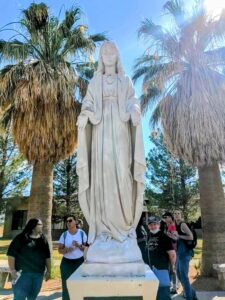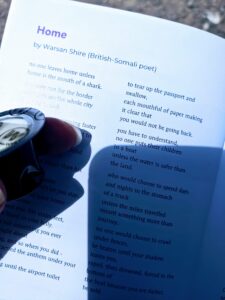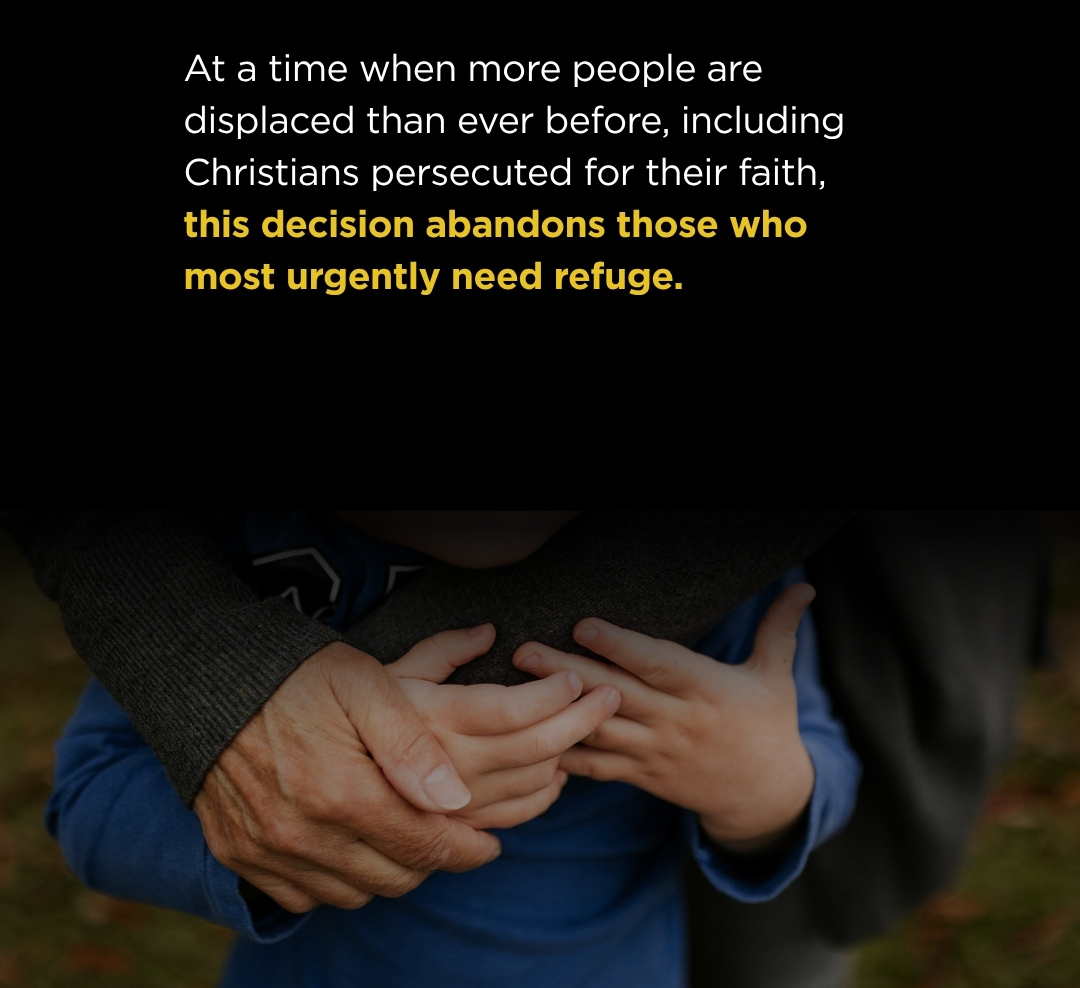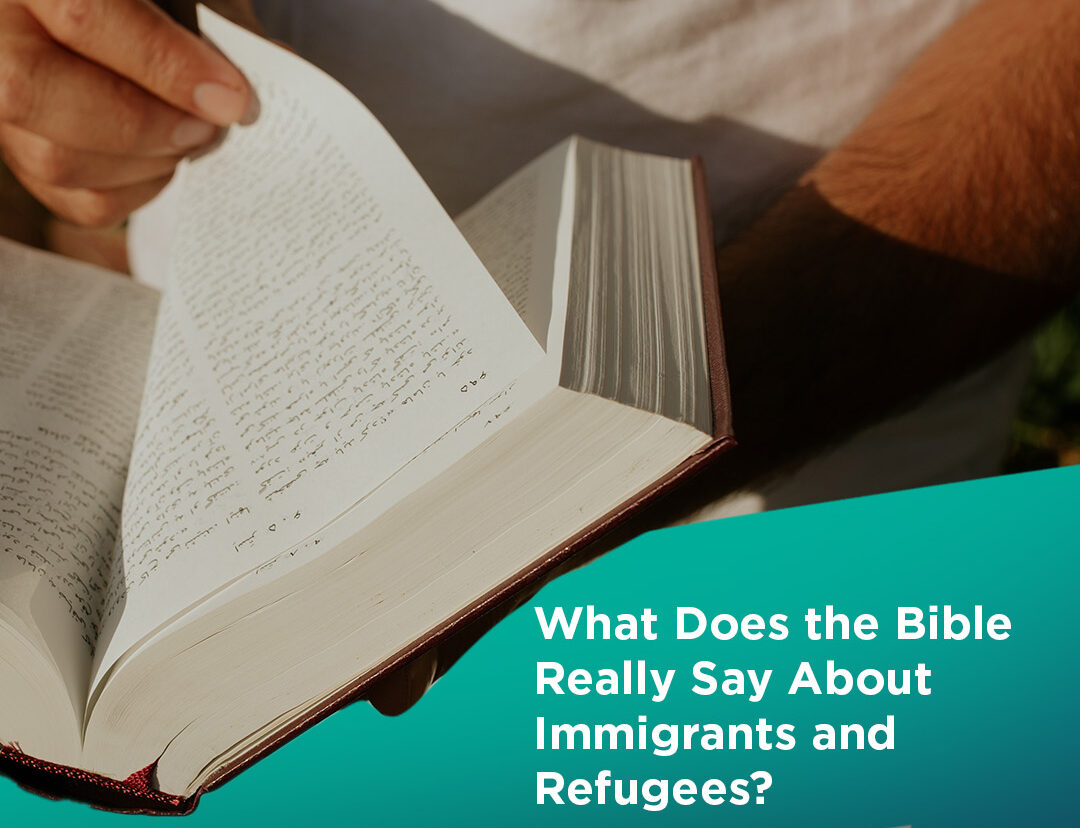 In the summer of 2022, Jenny Groen, Arrive Ministries Willmar Area Coordinator was invited to journey to the Southern border of the United States and Mexico with a group of women through Women of Welcome an affiliate of World Relief. Abara Frontiers led this educational and immersive trip.
In the summer of 2022, Jenny Groen, Arrive Ministries Willmar Area Coordinator was invited to journey to the Southern border of the United States and Mexico with a group of women through Women of Welcome an affiliate of World Relief. Abara Frontiers led this educational and immersive trip.
She shares some of her thoughts and reflections on that experience below. She chose not to share the names or faces of anyone she met, but tried to relay how their words and stories impacted her.
The church is in fathers fleeing violence, leaving home and country, sacrificing self to save family.
The church is in mothers walking over impossible terrain, enduring unimaginable hardship, carrying their babies, for months on end to reach safety.
The church is in countries where people pass through, offering refuge to the weary.
The church is in Mexico, at the border, opening its doors to welcome, love, and care for the displaced.
The church is in women who have lost everything, but struggle to survive one more day and give glory to God for each breath.
The church is in all the places we forget to look. This is where we see the true gospel being lived out, where the unconditional self-sacrificial love of Christ is lived and not just talked about. 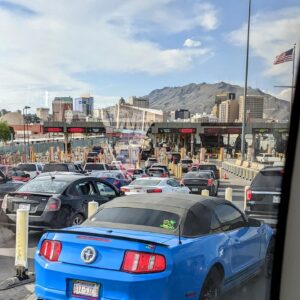 Where faith is clung to because it’s all there is some days. Where true peace & joy, beauty & hope radiate from.
Where faith is clung to because it’s all there is some days. Where true peace & joy, beauty & hope radiate from.
The church is in people. In refugees, immigrants, and asylum seekers. In shelter workers. And if you choose to get close, you will see it. The church, the radiant bride of Christ, whose light refuses to stop shining no matter how much darkness surrounds it.
And once you see it, you will know that the church is not lost, it’s just not in the places you have been looking.
An open-armed, I see you, I care about you, and I want you here, warm welcome changes everything.
God commands his people all throughout scripture to welcome and care for the widow, the orphan, the stranger. The church, especially here in America, has often been criticized (often fairly) for doing just the opposite.
In El Paso, Texas I had the great privilege of witnessing a church extending true Christ-like welcome to those in desperate need of it.
This shelter was the drop off location for asylum seekers who were being released by border patrol and/or ICE to pursue their case.
Imagine
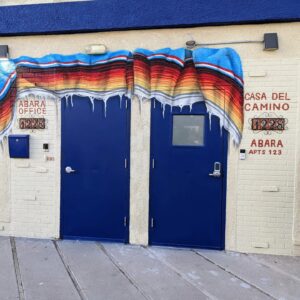 After experiencing the trauma of a home that you loved becoming a threat to your very existence.
After experiencing the trauma of a home that you loved becoming a threat to your very existence.
After making the hard decision to leave that home and flee north because it seems the only option you have left.
After leaving behind everything.
After walking for days, weeks, maybe months, hungry, scared, vulnerable.
After being hunted, tormented, chased.
After finally arriving, having survived the journey, but now facing armed patrols, barbed wire, and a wall.
After making that choice to take that first illegal step onto American soil in order to legally present yourself for asylum because that is the only option available to you.
After whatever long, horrendous journey you have endured.
You are treated as a criminal, but you make your case, you plea for your life, you put yourself at the mercy of the most powerful nation on earth and ask them for protection.
If granted a case, and not deemed a threat, then Border Patrol or ICE brings you here.
And you are greeted with an open-armed
“Welcome! We are so glad you are here!”
This is followed by a shower, clean clothes, a warm meal, and somewhere safe to sleep.
What a relief it must be to have loving arms wrap around you. To feel wanted. To be told you are safe and you are free.
This Catholic church in El Paso operates a shelter for those who are granted an asylum hearing. They are engaging in a beautiful and holy ministry of Welcome.
This is what it looks like to be the hands and feet of Jesus. The church’s call in all of this, no matter the policies or politics, is one of welcome.
“Asylum is a form of protection which allows an individual to remain in the United States instead of being removed (deported) to a country where he or she fears persecution or harm. Under U.S. law, people who flee their countries because they fear persecution can apply for asylum. An asylum claimant must demonstrate persecution based on one of the five protected grounds (race, religion, nationality, membership in a particular social group or political opinion).”
(definition taken from UNHCR)
In order to apply for asylum, you MUST BE ON U.S. TERRITORY
*************
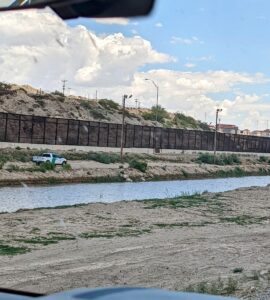 As we drove past this portion of the Rio Grande River, our leader explained that the actual border between Mexico and Texas is the river. The wall is not on the border. In fact, at every point the wall is 10 to 30 feet from the border so that border control has full jurisdiction on both sides.
As we drove past this portion of the Rio Grande River, our leader explained that the actual border between Mexico and Texas is the river. The wall is not on the border. In fact, at every point the wall is 10 to 30 feet from the border so that border control has full jurisdiction on both sides.
If you approach the wall from the Mexico side of the border you are already on U.S. soil. You have already crossed the border illegally.
As we drove along the river, we saw a family wading through. A man, woman, two children. They were pushing their way through deep water, walking straight towards a border patrol vehicle that looked just like this.
The moment their feet hit the ground as they climbed out of that river they had entered our country illegally. But also, the moment their feet hit the ground they could now legally ask for asylum.
It felt surreal to be watching such a moment from the comfort of an air conditioned vehicle.
 This moment when they decided to risk it, to put themselves at the mercy of border patrol, to ask for protection. This moment that was wrapped up in untold fear and suffering, but also strength, bravery, and an unyielding hope for a better life.
This moment when they decided to risk it, to put themselves at the mercy of border patrol, to ask for protection. This moment that was wrapped up in untold fear and suffering, but also strength, bravery, and an unyielding hope for a better life.
When I pictured an illegal entry into the United States I always imagined people sneaking in, climbing the wall, hiding, running. And those things do happen. But, what I learned is that the majority of people are not trying to evade border patrol at all. They cross illegally in order to find border patrol and ask for asylum.
I wondered that day if this family would be another number added to the tally of illegal entries. If their bodies touching our soil would be counted and used to spread fear of what some call an “invasion”.
I wondered if we would see it all differently if we talked about families approaching border patrol, moms seeking asylum, dads looking for work.
The numbers and dehumanizing language have for too long done exactly what they were meant to…allowed me to separate the humanity from the people. Allowed me to disconnect. Allowed me to not see or feel.
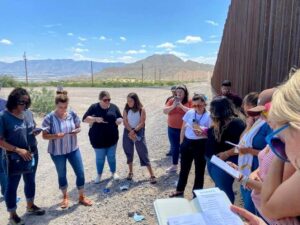 We climbed into the van that morning to head to the border wall for a time of communion and prayer.
We climbed into the van that morning to head to the border wall for a time of communion and prayer.
“Did you hear about San Antonio?” someone asked.
People had been found crammed into the back of a truck. They had somehow been smuggled over the border. At least 50 of them were found dead from the extreme heat.
I immediately pictured the faces of some of the women and children we had just met the day before at a shelter in Juarez, MX. Would they get desperate enough to climb into a truck, to be smuggled? What would it take to make that decision?
We stood by the wall that morning and read aloud this poem written by a Somali poet. Tears flowed as I pictured the many people that I love who have been forced to leave their home.
*********************
no one leaves home
unless home
is the mouth of a shark…
you have to understand
no one puts their children
in a boat
unless the water is safer
than the land
who would choose to spend
days and nights
in the belly of a truck
unless the miles travelled
meant something more than journey
no one would choose to crawl under fences…
*********************
Listen to the full poem here (audio by the author)
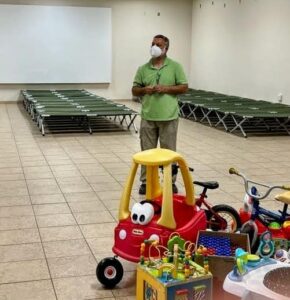 What I expected to find when we visited the Mexico side of the border was people living all along the border in makeshift tent camps. I’m sure some of these still exist, but I didn’t see them.
What I expected to find when we visited the Mexico side of the border was people living all along the border in makeshift tent camps. I’m sure some of these still exist, but I didn’t see them.
What I found instead was that all across Juarez, Mexico shelters had popped up. Shelters run by churches, run by people who saw a need and did not turn away from the suffering. Instead they opened their doors and welcomed those who had been turned away at the U.S. border.
Five years ago, these shelters did not exist. Up until a few years ago, asylum seekers were allowed to enter the U.S. Some would await their hearing in a detention center, most would wait with a host family.
After MPP (Migrant Protection Protocol aka Remain in Mexico) was put in place, most people who come to the border seeking asylum are told to wait in Mexico and they’ll be contacted when it’s their turn to be processed. Then Title 42 was put in place, and now nearly everyone is turned away to wait. Without an address, receiving notification of a hearing is very complicated and typically takes years.
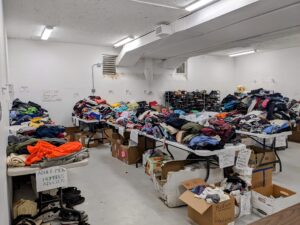 So people living in Juarez started taking in people who were waiting. They provide food, shelter and safety that is so desperately needed.
So people living in Juarez started taking in people who were waiting. They provide food, shelter and safety that is so desperately needed.
Through Abara, we had the great honor of visiting one of these shelters. It had been set up by a church and they welcomed mothers, pregnant women, and women who had been abused.
The women running this shelter were strong, resilient, brilliant. They were the definition of sacrificial love.
They planned a beautiful afternoon for us to spend time together. We sat alongside other mothers, their children, their newborn babies. They had traveled from El Salvador, Guatemala, Honduras, Venezuela, and Haiti. We played games, added our fingerprints to a community art project, and shared food. We laughed and we cried together. We prayed with each other and for each other.
At one point we all gathered in a room together, and the shelter director gave the women a chance to share. Many of them stood up one by one and graciously opened up their hearts to us. They shared what this day had meant to them, shared parts of their stories, and told us their hopes and dreams for their children and their future. Some had been there for a year, others for three. Some carried their children on the journey, some had to leave children behind to make the trek alone.
For brief moments I could see myself in them, as a mother who desperately wants what’s best for my kids, who would do anything to protect them. And yet I couldn’t because I cannot fathom the trauma they have endured and the impossibly hard decisions they’ve had to make to get here.
These women are some of the strongest, bravest humans I have ever met. Their stories were laced with pain, suffering, and loss and yet in that shelter on that day I also saw love, hope, and joy. They gave glory to God and poured out blessings on us. They joked, and played, and laughed. They held our hands and gave us hugs. They trusted us with precious pieces of their stories.
Every woman I met that day showed me what real love looks like and I will never be the same.
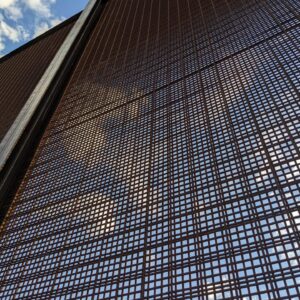 I went into my trip to the border with so many questions, this being one of them. I am very grateful for the many knowledgeable people who helped me better understand the current situation and allowed me to ask all the questions! Sami from Abara Frontiers and Matthew Soerens from World Relief gave us an education on the hows and the whys behind immigration.
I went into my trip to the border with so many questions, this being one of them. I am very grateful for the many knowledgeable people who helped me better understand the current situation and allowed me to ask all the questions! Sami from Abara Frontiers and Matthew Soerens from World Relief gave us an education on the hows and the whys behind immigration.
People coming to our southern border from Central and South America walk because for the vast majority, it is the only option available to them.
The only status most would possibly qualify for is asylum.
In order to request asylum, you must be on American soil.
So they walk.
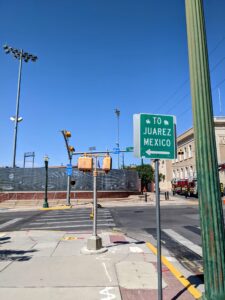 Most are leaving home because the situation has become so dangerous they cannot stay.
Most are leaving home because the situation has become so dangerous they cannot stay.
Some are literally fleeing for their lives and have no where else to go.
Some leave children behind and make the dangerous journey alone hoping to provide a safe way for their kids to come once they reach safety.
Some literally grab their kids and run because the danger is so close.
Some travel in large groups for safety.
I’m not sure exactly how long it takes to walk from each place, but I know people travel for weeks or months at the mercy of the elements, smugglers, and gangs, relying on the kindness of strangers to give them refuge.
The statistics for how many are attacked, abused, and raped at some point on the journey is staggering.
And yet they walk anyway. I cannot imagine what it would be like to make that choice. The bravery it must take. The desperation one must feel.
Most of the people I met came from Central America, Guatemala, El Salvador, Honduras. But some from further away, Venezuela and even Chile.
People walk because our laws require it. And I wonder if there’s a better way.
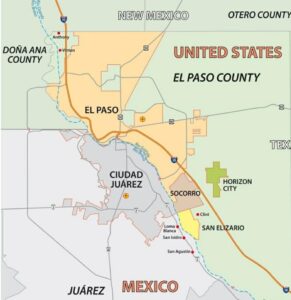 El Paso, Texas / Ciudad Juarez, Mexico
El Paso, Texas / Ciudad Juarez, Mexico
Two cities. One on the southern border of the United States, the other on the northern border of Mexico. They are separated by a river and a wall.
My prayer as I traveled to these borderlands was
“God, give me eyes to see and break my heart for what breaks yours”
I was invited on this trip by Women of Welcome an affiliate of World Relief . Abara Frontiers led us on this educational and immersive trip.
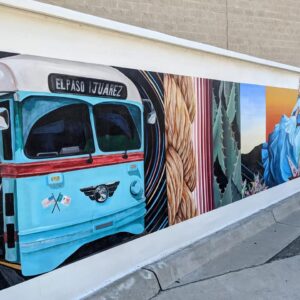 We spent time on both sides of the border, and visited several different portions of the wall and ports of entry.
We spent time on both sides of the border, and visited several different portions of the wall and ports of entry.
We spent time with women in a shelter in Juarez and visited a Catholic run shelter in El Paso.
We talked with people who were hoping to immigrate and those that have tried and failed.
We met with border patrol.
We received education on policy, procedures, reasons for migration, the complexities of our system, and interconnectedness of our world.
We spent time learning what the Bible has to say about immigration.
We listened, asked questions, shared struggles, and learned from each other.
Sitting here at home I am completely physically, mentally, and emotionally exhausted. But I left the trip with an even stronger resolve to not look away.
There is no easy answer when it comes to immigration. I know that for sure. But, we can do better.
We must start seeing the people, the human beings who just want to live, work, and raise their children in safety.
We must see how policy and rhetoric strips away dignity and causes unneeded human suffering.
We can have secure borders & allow for more legal immigration.
We can reform our systems to lessen the suffering.
We can change our rhetoric to reflect humanity & dignity.



